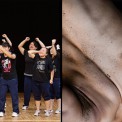Festival/Tokyo 2014 is now over. Thank you to all our audiences and visitors.
-
11.30.2014
Symposium: “Diversity in Art”

November 16th, November 24th, 2014

Theme 1: Tokyo Metropolitan Theatre, Atelier East
Themes 2, 3, 4: Tokyo Metropolitan Theatre, Theatre West

Theme 1: Free (reservations only)
Themes 2, 3, 4: ¥500 per session

| 11/16 (Sun) | Theme 1: 19:00-21:00 |
|---|---|
| 11/24 (Mon) | Theme 2: 13:00-15:00 |
| 11/24 (Mon) | Theme 3: 16:00-18:00 |
| 11/24 (Mon) | Theme 4: 19:00-20:30 |
Box office opens 30 minutes before.
Doors open 30 minutes before.
Theme 1: Korean Dawon Arts Today and Tomorrow
Panellists: Haejin Phang, Soyeon Kim, Seunghyo Lee
Moderator: Yuko Uematsu (Festival/Tokyo)
![]()
| November 16th, 2014 19:00-21:00 |
![]()
| Tokyo Metropolitan Theatre, Atelier East (Discover Atelier) |
![]()
| Free / Reservations only / Capacity: 50 |
Dawon translates as interdisciplinary arts or multidisciplinary arts, meaning a hybrid multi-field field genre of arts across theatre, dance, cinema, visual art, literature, music and community art. The word began to be used in Korea from the early 2000’s initially as a term employed in cultural policy for artworks that could not be assigned to existing categories. It is hard to define precisely because of its interdisciplinary nature. It is distinguished not simply by collaborations between artists across different genres but how the works themselves are created through disconnected elements right to the core. The methods of output are free and dawon works also frequently deal with social themes. The final resulting work need not be assigned to an existing framework, forming a new genre that is diverse and which allows for new interpretations and creativity. This symposium will discuss the context that led up to the birth of Korean dawon, its influence on the contemporary performing arts in Korea, and its future trajectory.
Language: Korean (Japanese interpretation)
Panelists
Haejin Phang
Critic, Producer, Translator
She has worked in criticism across many different fields, from performing arts to film and contemporary art, receiving awards from the Seoul Performing Arts Festival and more. She has recently also worked as a producer and director, serving as a dramaturge for the National Contemporary Ballet Company’s project “Cross Cut” and planning the exhibition “¡No Dance!: Between Body and Media”. She is currently preparing a dawon project called “Hypermetamorphosis Theatre”. Her many writings and translations include Carl Theodor Dreyer and Roberto Rossellini.
Soyeon Kim
Critic, Editor of Theatre Review magazine
Kim has previously served as editor of The Korean Theatre Journal and as chief editor of both Culture News and weekly@Arts Management. She is currently on the editorial board of Theatre Review magazine. She researches cultural policy for dawon and was on the dawon committee for Arts Council Korea from 2005 to 2009.
Seunghyo Lee
Director, Festival Bo:m
Born in Seoul in 1984. He moved to Tokyo in 2009 where he began working for Asian programs at Festival/Tokyo and Izayoi Yoshidamachi Studio. He also conducts research on Korean dawon and art festivals. In July 2013 he was appointed as the second director of Festival Bo:m and currently works in both Korea and Japan.
Theme 2: 10 Years of Dramaturgy in Japan
Panellists: Kaku Nagashima, Yoshiji Yokoyama, Eiichiro Hirata, Masahiko Yokobori
Moderator: Sachio Ichimura
![]()
| November 24th, 2014 13:00-15:00 |
![]()
| Tokyo Metropolitan Theatre, Theatre West |
![]()
| ¥500 (reservation recommended) |
Almost ten years have passed since the symposium on dramaturgy was held at Tokyo International Arts Festival 2005. Since that time Eiichiro Hirata’s book on the subject was published in 2010 and the role of the dramaturge has become better known in Japan. It is a profession originally specific to the German-language theatre world and its repertory system. Japan has a very different environment for the arts and until now the role of the dramaturge has come to be seen as that of the “partner” of the director. This emphasizes the artistic side to dramaturgy, but what about the elements of dramaturgy associated with producing and programming? This symposium brings together Japanese dramaturges with experience in both sides of the profession, in order to discuss both the previous ten years of dramaturgy in Japan and its future.
Language: Japanese
Panelists
Kaku Nagashima
Dramaturge, Translator
Born in 1969. A pioneer of dramaturgy in Japan, he is involved with script development from concept to editing and structuring, as well as working with voice and body. He helped created the double bill “Yotsuya Zotanshu” and “Yotsuya Kaidan” for F/T13, alongside Shigeki Nakano. He has also recently been participating in projects outside of theatre buildings, such as for the site-specific House of Atreus project.
Yoshiji Yokoyama
Literary Department, Shizuoka Performing Arts Center
Born in Chiba in 1977. He studied theatre in France from 2000 and then joined the Shizuoka Performing Arts Center in 2007 as a production co-ordinator. In 2009 he joined the Literary Department at SPAC and since then has handled the center’s overseas commissions. He is a part-time lecturer at Gakushuin University, having gained his Ph.D. in theatre studies from Paris West University Nanterre La Défense. His thesis was on the theatre theory of Aristole. His translations include “Les Marchands” by Joël Pommerat.
Eiichiro Hirata
Faculty of Letters, Keio University
German-language theatre researcher. He received his Ph.D. from Keio University and has been a professor there since 2012. His writings and co-writings have been published in Japan and Germany, and his co-translations include “Ästhetik des Performativen” (Erika Fischer‐Lichte) and “Postdramatisches Theater” (Hans‐Thies Lehmann).
Masahiko Yokobori
Dramaturge, Festival/Tokyo 2014 Directors Committee
Born in 1986. He completed his Ph.D. at the Department of Musical Creativity and the Environment, Tokyo University of the Arts. He majored in dramaturgy at the University of Music and Theatre Leipzig. He has worked as a production co-ordinator for “Japan Syndrome”, festival of contemporary Japanese work programmed at Hebbel am Ufer (HAU) in May 2014, as well as serving as a dramaturge for opera at Tokyo Metropolitan Theatre and Nissay Theatre. At present, he is a researcher at Tokyo University of the Arts’ Graduate School and for Arts Council Tokyo (music and theatre).
Theme 3: Beijing, China: The Contemporary Fringe Theatre Scene
Panellists: Qingmei Tao, Xiaoxing Sun
Moderator: Hitomi Oyama
![]()
| November 24th, 2014 16:00-18:00 |
![]()
| Tokyo Metropolitan Theatre, Theatre West |
![]()
| ¥500 (reservation recommended) |
Last year two new books were published in China by theatre critics about the country’s burgeoning fringe scene. Qingmei Tao’s “A Thirty-Year Review of Experimental Theatre in China 1982-2012″ traces the development of the movement from the 1980′s through the 1990′s as new experimental theatre, and finally emerging as a full alternative theatre scene with private investment from the 2000′s. 2007 saw the launch of the Beijing Fringe Festival. On the other hand, Sun Xiaoxing’s “Re-Theatre: The Independent Theatre Cities Map” takes an overview of the fringe artists and companies currently active in Beijing, Shanghai and Guangzhou, including information on even the theatre building design, stage and lighting. Both critics will speak at this symposium about cutting-edge theatre scene in Beijing, as well as the problems of censorship and the current system in China.
Language: Chinese (Japanese interpretation)
Panelists
Qingmei Tao
Researcher at Chinese Academy of Social Sciences, Editor of Beijing Culture Review, Theatre Critic
Born in 1974. Since 2000 she has been attached to the Chinese Academy of Social Sciences, an influential think tank. She was a guest researcher at Columbia University from 2009 to 2010, and her writings include “A Thirty-Year Review of Experimental Theatre in China 1982-2012″ (2013).
Xiaoxing Sun
Critic, Writer, Director, Lecturer at Tianjin Conservatory of Music
Born in 1986. He researches Chinese theatre history and theory. He has been invited to the Golden Hedgehog University Theatre Festival, Beijing Fringe Festival, Small Theatre Big Drama Asia Dialogue (Hong Kong), TPAM in Yokohama 2014, and many others. His writings include “Re-Theatre: The Independent Theatre Cities Map” (2013).
Theme 4: Art Cultivated by Cities
Panellists: Sumiko Kumakura, Sasana Nemoto, Tetsuo Kuwaya
Moderator: Sachio Ichimura
![]()
| November 24th, 2014 19:00-20:30 |
![]()
| Tokyo Metropolitan Theatre, Theatre West |
![]()
| ¥500 (reservation recommended) |
Since the 1990’s so-called “art projects” have been emerging all over Japan, including art exhibits in cities and villages, festivals, and socially experiment activities. The projects have attracted attention outside the field of contemporary art as ways to connect to reviving regions and tourism. Not simply exhibiting the artworks, recent art projects engage in more proactive ways to show artworks to the public, including the creation process, and are involved in the local community. The projects require not only the artists but also the contributions of residents and volunteers. In this way, the art is cultivated by the regions and the communities. In the performing arts, we have seen many works that have left the theatre building and used the space of the city itself for the performance, as well as other projects where work is created along with local residents. While these too connect to community-building, we could say that art is here also being cultivated within the regions and communities. This symposium will discuss this topic from the perspectives of both contemporary art and theatre, and debate the potential such projects have for the future. Guest speakers include Sumiko Kumakura, a researcher into the relationship between the arts and society, Tetsuo Kuwaya, who runs ZA-KOENJI, the theatre in west Tokyo that has engaged in many local community activities, and Sasana Nemoto, a producer with experience in civic groups and art non-profits, as well as events organized with corporations, such as the Asahi Art Festival.
Language: Japanese
Panelists
Sumiko Kumakura
Department of Musical Creativity and the Environment, Tokyo University of the Arts
After working for the Association for Corporate Support of the Arts, she joined the Department of Musical Creativity and the Environment at Tokyo University of the Arts in 2002. She has worked with regional art projects such as Toride Art Project (Ibaraki Prefecture) and Art Access Adachi (Tokyo). She investigates the relationship between arts management and the civil society, and makes proposals for cultural policy.
Sasana Nemoto
Public Relations Department, Asahi Breweries, Ltd.
Nemoto joined Asahi in 1999. After working in the company’s Osaka office, she was responsible for Association for Corporate Support of the Arts for 12 years from September 2002. In this time she developed a range of partnerships between Asahi and the arts, including the Asahi Art Festival, Asahi Art Square, Sumidagawa Art Project, and the Lobby Concerts series. After experience in theatre, art and music projects nationwide, she moved to the Public Relations Department in September 2014.
Tetsuo Kuwaya
Executive Director, ZA-KOENJI
He graduated with a degree in theatre from Nihon University. He started as a stage lighting designer for the Nissay Theatre while still at college, before going on to handle the lighting for companies such as Jiyu Gekijo and Black Tent, and Butoh dance performances. He then served as technical manager at theatres such as Setagaya Public Theatre. He was head of Kani Public Arts Center before becoming Executive Director of ZA-KOENJI in west Tokyo. He is also a part-time lecturer in theatre at Nihon University.
Map
Tokyo Metropolitan Theatre
1-8-1 Nishi-Ikebukuro, Toshima-ku, Tokyo
Tel: 03-5391-2111
2 minutes’ walk from West Exit of Ikebukuro Station on JR Line, Tokyo Metro, Tobu Tojo Line, and Seibu Ikebukuro Line. (Direct connection to the theatre from Exit 2b.)
























